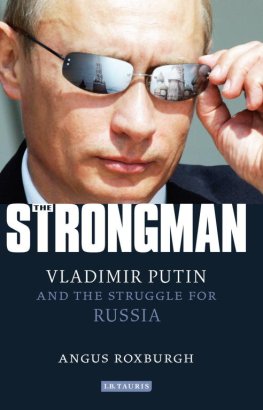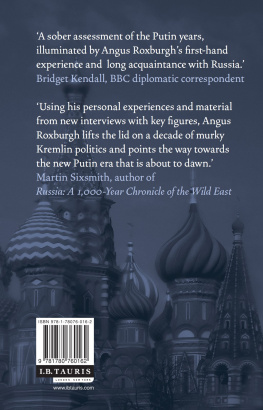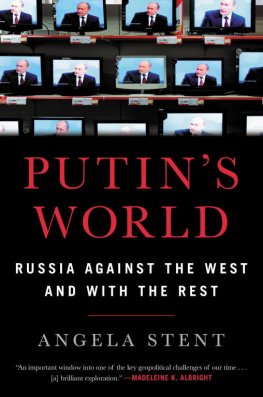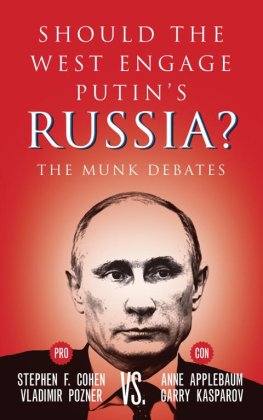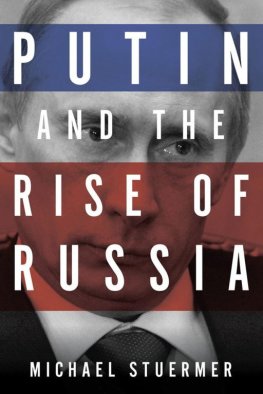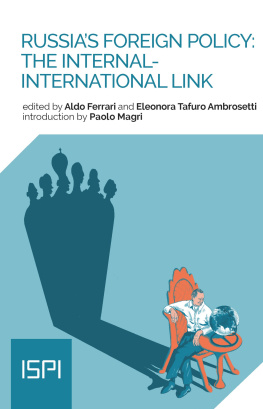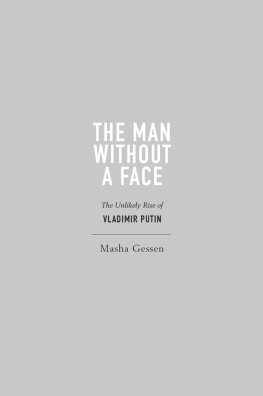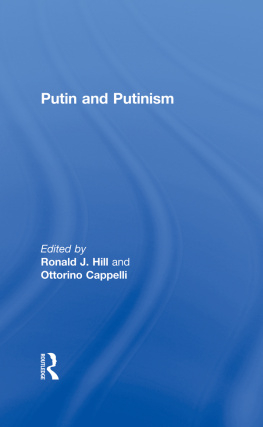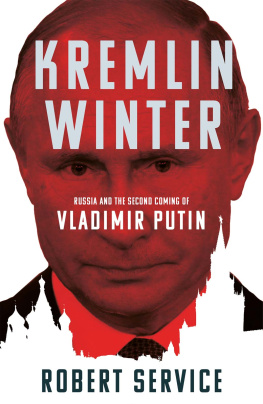Angus Roxburgh
THE STRONGMAN
Vladimir Putin and the Struggle for Russia


When you shake hands with Vladimir Putin you scarcely notice whether it is a firm or a weak handshake. It is his eyes that consume you. He lowers his head, tilting his eyes upwards towards you, and fixes you for several seconds, as though memorising every detail, or maybe matching your face to a picture he had memorised earlier It is a glowering, piercing, highly unsettling look.
Russias national leader is like no other countrys president or prime minister. The former KGB spy was rather reserved and gauche at first, when he was unexpectedly propelled into high office in 1999. But he has grown into a man with no inhibitions a strongman and a narcissist, who flaunts his physical strength in ever more frequent photo-shoots. In the beginning we saw only a few selected images Putin the judo champion, Putin at the controls of a fighter jet. Later particularly after he moved from the presidents office to that of the prime minister in 2008 he began to invite camera crews on expeditions designed solely to project a film-star image. They showed him putting satellite tracking devices on polar bears, tigers, white whales and snow leopards. He took the cameras along to see him swimming the butterfly stroke in an icy Siberian river, and riding a horse through mountains, with bare chest and dark shades. He personally put out wildfires, drove snowmobiles, motorbikes and Formula One cars, went skiing and scuba-diving, played ice hockey, and even crooned Blueberry Hill in English and played the piano in public unembarrassed by his inability to do either. In August 2011 he had a cameraman on hand when he stripped to the waist for a doctors examination.
What other world leader acts like this? Having muscular policies is one thing; but no one matches Putin for sheer vanity.
In conversation he is attentive, combative and sometimes explosive, when he touches upon sensitive matters. He is exceedingly well-informed, but also surprisingly ignorant about aspects of Western life. He is courteous, but can also be boorish. As president and then as prime minister he has run Russia with a strong, and tightening, grip. In recent years he has taken to dressing down his ministers in public, creating an atmosphere in which most of his subordinates are terrified of contradicting him, or even of voicing an opinion in case it might contradict him. He has created a top-down system the vertical of power which instils fear and stifles initiative.
Russia has become a state contemptuous of its peoples rights: a country in which the head of the electoral commission says his guiding principle is that whatever Putin says must be correct, and the chairman of parliament describes it as no place for discussions. It is a country in which the most important decision about who will become president is effectively taken in private by two individuals, with no reference to the populace. This was what happened in September 2011, when Putins protg and successor as president, Dmitry Medvedev, agreed to retire from the top job after one term to allow Putin to return as president in 2012 for, potentially, another 12 years. The two men cynically admitted what people had suspected but did not know for sure, that this had been the plan ever since Putin had stepped aside from the presidency in 2008: Medvedevs stint in the Kremlin was a mere seat-warming exercise, designed to keep Putin in power for as long as he wished, while paying lip-service to (or, in fact, flouting) the constitutional ban on a president serving more than two consecutive terms.
Putin did not start out like this. Back in 2000 many Western leaders at first welcomed his fresh, new approach, and his willingness to cooperate and seek consensus. It will be the task of this book to try to chronicle and explain how everything changed: why Putin became more and more authoritarian, how he challenged the West and how the West challenged him too; how each side failed to see the others concerns, causing a spiral of mutual mistrust and lost opportunities. On the one hand there is what the Americans and the West observed: Russias political crackdown, the brutal war in Chechnya and murders of journalists, the corrupt mafia state and growing bellicosity, culminating in the invasion of Georgia and the gas wars against Ukraine. On the other, there is Russias view: Americas domineering role in the world, its missile defence plans, the invasion of Iraq, the expansion of NATO, Russias positive gestures that went unanswered, the perceived threat to spread revolutions from Georgia and Ukraine to Russia. And there is each sides failure of vision: Putins inability to see any connection between his own repressions at home and the hostile reaction abroad; George W. Bushs inability to understand Russias age-old fear of encirclement or its fury at his high-handed foreign policy adventures.
At the time of writing Putin remains the most popular politician in Russia, perhaps because of the measure of stability and self-esteem he restored to peoples lives, and because living standards improved during his rule, due largely to high oil prices which benefit Russia. And yet he has failed in many of his stated goals. Having come to power promising to annihilate terrorism, the number of attacks has grown; corruption has soared, and cripples the economy; the population has slumped under his leadership by 2.2 million people; foreign investment has been far lower, as a percentage of Russias economic output, than rival fast-growing emerging markets such as Brazil or China; and, despite the massive inflows of energy revenues in the past decade, Russia has failed to create a dynamic, modern economy. This book looks at the struggle for reform inside Russia, and asks whether Dmitry Medvedev as president was (as it often seemed) a frustrated liberal or mere window-dressing.
Politicians are prone to oversimplify complicated issues, especially if it is in their interests to do so. This has been especially true of the discussion in recent years of what is perhaps the trickiest of all international political problems the right of small nations to self-determination. Kosovo, Chechnya, South Ossetia, Abkhazia, Transnistria gallons of ink and roomfuls of hot air have been expended in explaining, usually with categorical assurance, that one small countrys independence is or is not a precedent for others. Usually it is the big mother country that insists all other cases are unique (Russia vis- -vis Chechnya, Georgia vis- -vis South Ossetia and Abkhazia), while the small nations demand to be treated the same way as those who gained their freedom. It is an issue of exceptional importance in Russia, a multinational state like no other, where dozens of nationalities coexist, some with greater or lesser autonomy, and where the Kremlin has a pathological fear of the state disintegrating if any one of those nations is allowed to set a precedent by gaining independence. The issue runs through the history of the last decade, from the war in Chechnya and the welter of terrorist incidents in Russia, to the short war between Russia and Georgia in 2008. Usually no side is right in any of these conflicts, and it would be simplistic to pretend otherwise just as it would be simplistic to pretend that the Wests decision to recognise Kosovo and NATOs decision on future membership for Georgia and Ukraine had no bearing on relations between Russia and its neighbours. Perceptions and misperceptions of the other sides intentions often play a greater and usually more harmful role than reality.

